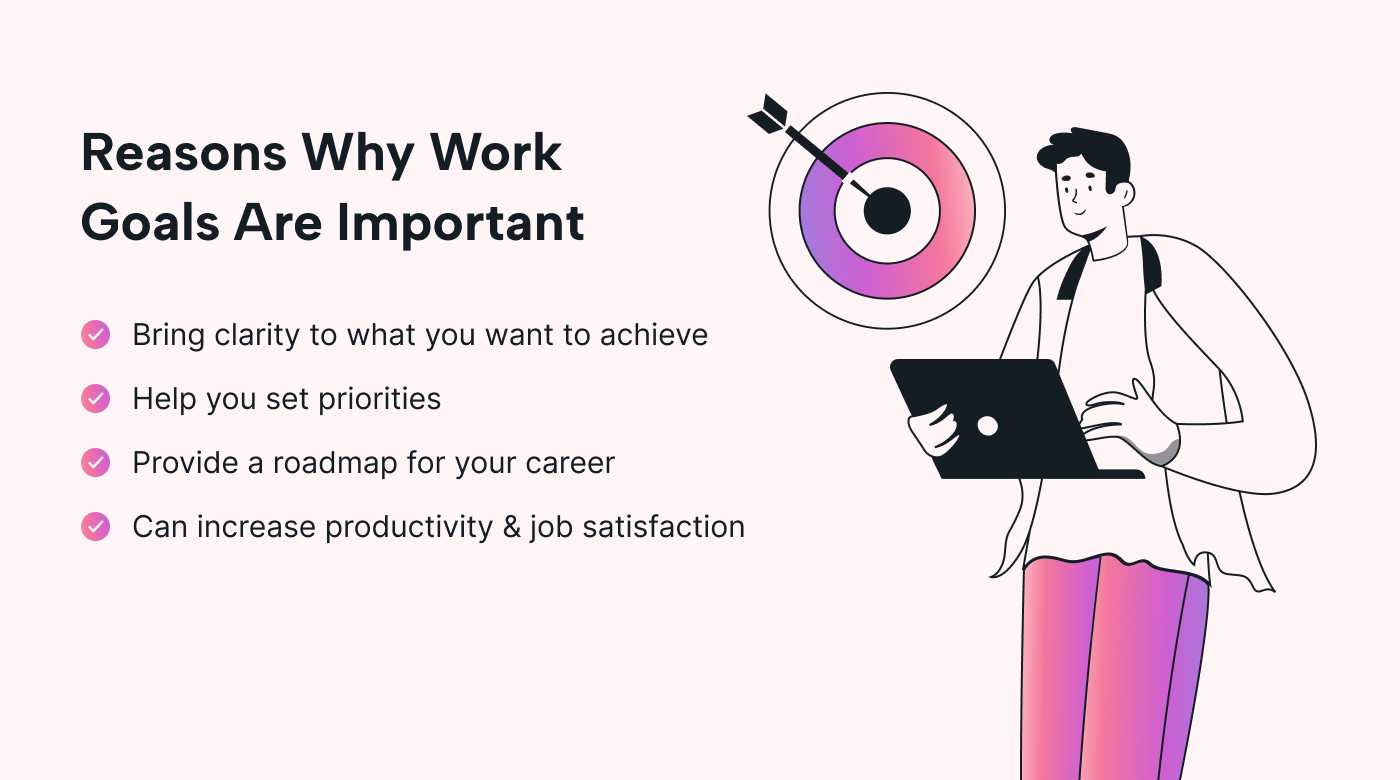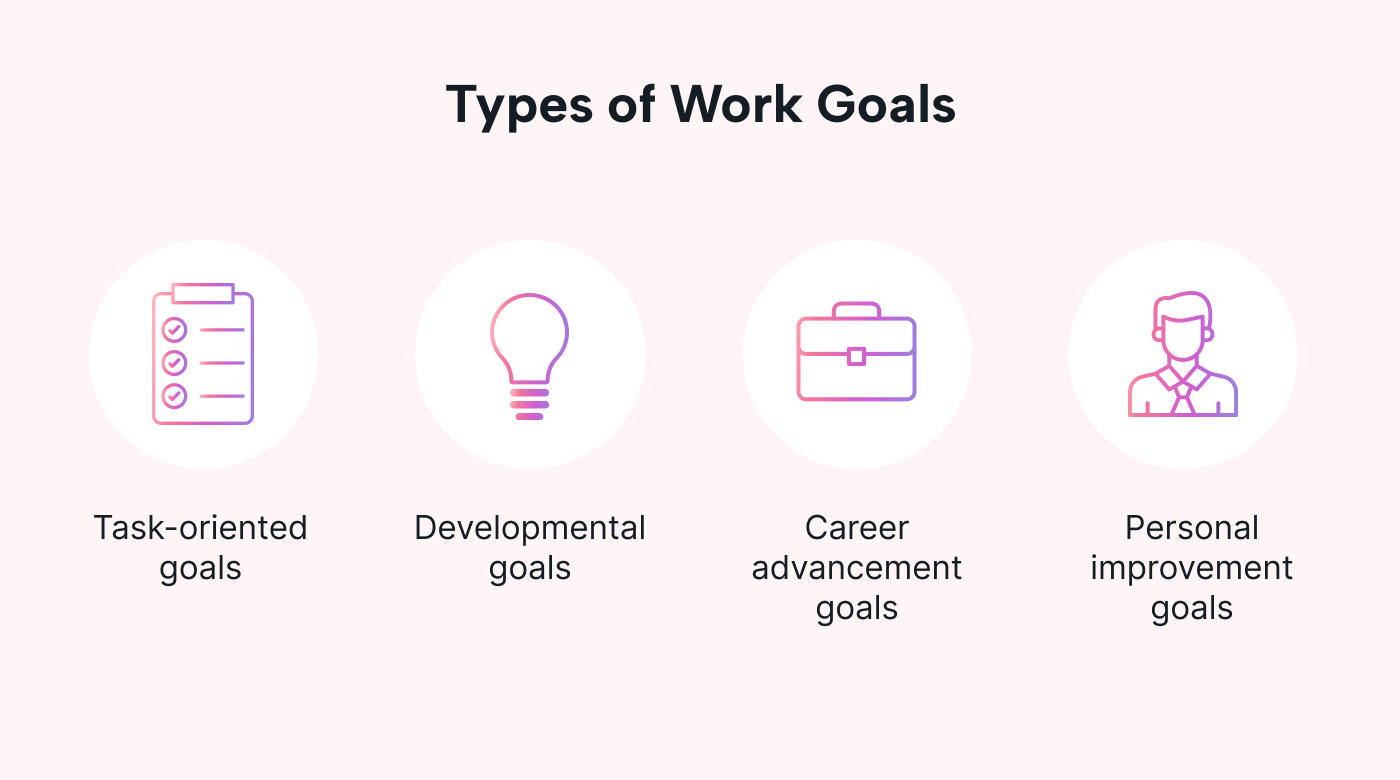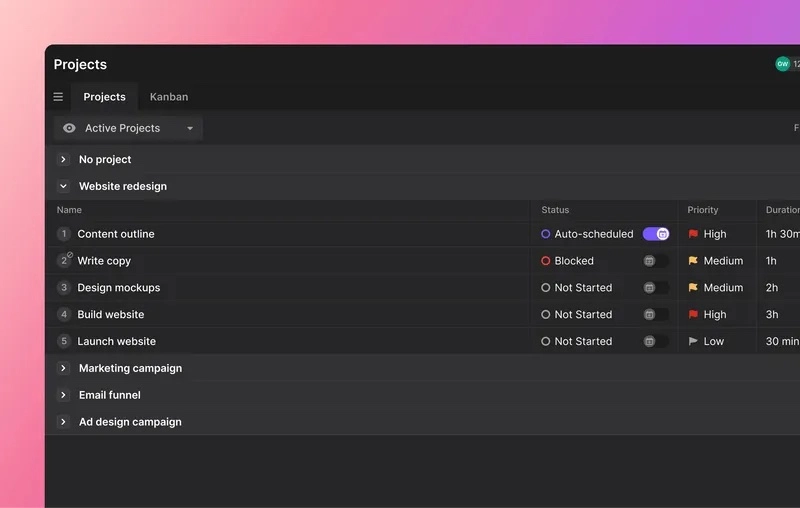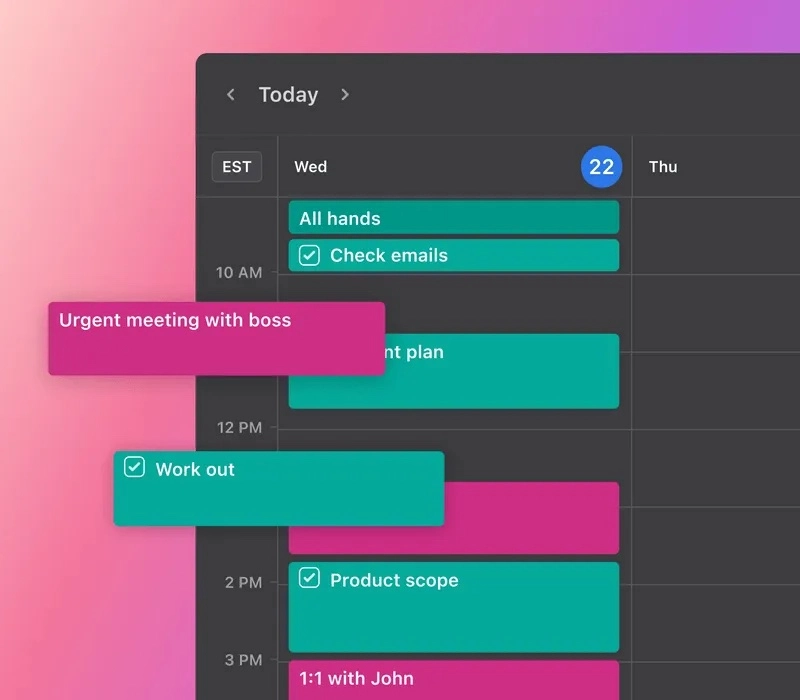Do you feel stuck in your professional life, unsure about what you want to achieve or how to get there?
The answer could be as simple as setting clear, actionable work goals.
Whether you’re a seasoned professional or just starting out, work goals can provide the structure and focus you need to turn your ambitions into reality.
In this article, we dive into what work goals are, provide 16 different examples, and, most importantly, teach you how to achieve the goals you set.
What are work goals?
Work goals, professional goals, or professional development goals, are objectives or targets that individuals set for themselves in their profession. These goals can be short-term or long-term, and can be related to specific tasks, projects, career advancement, or personal development.
Short-term work goals can include completing a specific project, mastering a new skill or technology, improving your communication skills, or increasing your productivity. These goals can be achieved within a few months or even weeks.
Long-term work goals, on the other hand, may involve reaching a certain position within a company or industry, developing leadership skills, or starting a business. These goals may take several years to achieve and often require significant effort, dedication, and hard work.
Why are work goals important for professional growth?
Setting work goals is like having a personal GPS for your career. You wouldn’t set off on a road trip without a map, and the same goes for your professional journey. Work goals provide you with a clear destination and a roadmap for getting there.
Let’s take a closer look at how setting work goals can benefit you.

Bring clarity to what you want to achieve
It’s easy to get lost in the hustle and bustle of daily work life, but taking the time to define your goals can help you gain a clear understanding of what you want to achieve and why that matters.
You’ll be able to focus your efforts on what truly matters and avoid getting bogged down by distractions.
Help you set priorities in your professional life
We all know the feeling of being pulled in a million different directions at work. It can be overwhelming! But by setting work goals, you’ll be able to distinguish the important from the urgent and ensure you’re spending your time where it counts.
Provide a roadmap for career progression
Setting work goals is like creating your very own career roadmap — you get to decide where you want to go and how you’re going to get there. This can be incredibly empowering, plus you’ll be able to identify the skills and experiences you need to develop to progress in your career.
And by tracking your progress along the way, you’ll be able to see just how far you’ve come since you started.
Increase productivity, job satisfaction, and overall performance
When you have a clear understanding of what you want to achieve, you’ll be able to focus your energy on the things that matter most. You’ll be able to work more efficiently, avoid burnout, and experience a greater sense of purpose in your work.
And let’s not forget the satisfaction of crossing things off your to-do list! Achieving work goals can be very rewarding, helping to boost your confidence and sense of accomplishment.
4 types of work goals
It’s important to note, however, that not all work goals are created equal. There are several types of work goals that serve different purposes.

Task-oriented goals
Task-oriented goals are focused on specific tasks or projects that need to be completed within a set time frame. They can be great for helping you stay on track and prioritizing your work effectively.
Tools like Motion’s task manager can help you manage your tasks and stay organized. Breaking down larger projects into smaller, more manageable tasks can help keep you from getting overwhelmed and ensure that you stay motivated as you work toward completing each step.
Developmental goals
Developmental goals are focused on acquiring new skills, knowledge, and expertise to enhance your professional growth. These types of goals can be great for helping you stay current and relevant in your field, and they can also help you discover new career opportunities.
Prioritizing your professional development will equip you to succeed in your current role and prepare you for future opportunities.
Career advancement goals
Career advancement goals are focused on moving up in your organization, obtaining promotions, or achieving higher levels of responsibility. These are usually long-term career goals.
Personal improvement goals
Personal improvement goals are focused on enhancing personal traits or behaviors that can positively impact your job performance and satisfaction. These types of goals can be great for developing the soft skills that are important for any role.
How to set work goals that lead to success
People set goals with the best of intentions, but in reality, only 6% of people who want to change something in their lives actually succeed.

Why? Because these goals often lack a clear action plan or are vague or unrealistic.
Here’s a simple six-step guide to turn your aspirations into achievements:
1. Set your sights
Start by reflecting on your long-term career objectives. Consider these three sections to shape your vision:
- Aspirations: What do you want to achieve in your career? Where do you see yourself in the next 5 or 10 years?
- Passion: What roles or industries excite you? What kind of impact do you want to make?
- Motivation: What motivates you? What kind of work environment best suits you?
Taking the time to answer these questions will help you be clearer about what you want for the future. It also makes sure that the short-term goals you set align with your long-term goals. Knowing where you're headed makes you more likely to stick with it, even in the face of challenges.
2. Reflect and assess
Review your current job description and performance expectations. What are the key responsibilities and expectations for your role? What are the performance indicators that you are evaluated against?
Understanding what is expected of you in your current role will help you set meaningful work goals that are aligned with your job responsibilities.
Moreover, think about the kind of feedback you’ve received. What specific areas have you consistently excelled in? Are there any areas in which you can improve? Do you have any skill gaps that need to be addressed?
Asking your colleagues and managers for honest feedback about your strengths and weaknesses will give you important insights into your work performance. You can also do a self-assessment to see how your perception of yourself compares to how others see you.
Identifying areas for improvement will help you set achievable goals that are relevant to your professional development.
3. Break down and prioritize
Turning your overarching goals into smaller, more achievable objectives can help make them more manageable.
Once you’ve identified your professional goals, prioritize them based on their importance and relevance to your overall career objectives. Consider which ones are most critical for your professional growth and development, and focus on those first.
It’s also a good idea to assign deadlines to each goal so that you can hold yourself accountable and track your progress over time. Additionally, list the resources you’ll need to achieve each goal, including time, funding, tools, training, and support from your team.
4. Create an action plan
Create a detailed action plan for each of your professional goals. Break down your goals into smaller, manageable steps, and outline the resources and timeline you’ll need to achieve them.
Having a clear action plan will help you stay organized and focused on your goals. Remember to think ahead about any problems that might come up and have a contingency plan for how you'll deal with them if they do.
5. Track your progress
Setting goals is only half the battle. You must also track your progress.
Thirty-four percent of leaders believe that the top challenge to goal setting and management is not having the right tools to monitor and manage them, and the same percentage also believe that this is because of inconsistent follow-up on progress. That’s why it’s essential to have a system in place to keep track of your progress, achievements, and milestones.
With the help of Motion’s project manager, you can schedule tasks, delegate them, and monitor your and your team’s progress in achieving them.

Our AI calendar app can also send you reminders of when tasks are due, helping you stay on track and avoid missing important deadlines.
6. Review and revise
Regularly evaluate your progress in achieving your goals. If you find that you are not making progress toward a specific goal, make adjustments or break it down into smaller, more achievable objectives.
Schedule regular check-ins to assess your progress and make adjustments as needed. This will help you stay on track and ensure that your professional goals remain relevant and aligned with your overall career objectives.
16 examples of work goals to get you motivated
It’s not enough to simply set any goal — it needs to be SMART. SMART goals are specific, measurable, achievable, relevant, and time-bound.
Not sure how to start? Here are some work goal examples to inspire you, along with how they can bring value to your personal and professional development.
Task-oriented goals
1. Increase social media engagement by 25% through targeted marketing campaigns.
This is a good example of a specific goal because it includes a specific metric — a 25% increase in social media engagement.
Actionable step you can take today: Research and identify the target audience for your social media marketing campaigns.
2. Increase employee engagement scores by implementing a recognition and reward program.
This is a good example of a work goal that focuses on your colleagues. It specifically includes what you want to achieve and how you are going to do it.
Actionable step you can take today: Brainstorm different types of rewards and recognition programs that your team would appreciate.
3. Reduce customer wait times by 20% within the next quarter by hiring additional customer service representatives and implementing a streamlined customer service process.
This statement has all the characteristics of a SMART goal. It’s specific, measurable, achievable, relevant, and time-bound.
Actionable step you can take today: Start drafting job descriptions for additional customer service representatives and begin researching different customer service software options.
4. Reduce the average time it takes to onboard new employees by 15% within the next six months by creating standardized training materials and automating repetitive tasks.
This goal focuses on improving the efficiency and effectiveness of the onboarding process for new hires.
Actionable step you can take today: Identify the most time-consuming tasks in your current onboarding process.
Developmental goals
5. Complete a professional development course to enhance your technical skills.
This goal demonstrates a commitment to staying up to date with industry trends and best practices.
Actionable step you can take today: Make a list of the skills you want to develop and explore relevant courses or workshops offered online.
6. Participate in a leadership development program to enhance your team-building, decision-making, and conflict resolution skills.
This goal focuses on improving your leadership abilities, making you a more effective manager and team player.
Actionable step you can take today: Research leadership development programs your company or an external organization could offer.

7. Learn Python to expand your coding capabilities and open up new opportunities in software development.
This is a great goal for those who want to branch into the software development, data analysis, or automation industries.
Actionable step you can take today: Sign up for a Python course or look for free YouTube tutorials to practice basic coding.
8. Attend industry conferences, webinars, or workshops to stay updated on the latest trends, technologies, and best practices in your field.
Setting this goal shows your commitment to continuous learning and improvement. It ensures that your skills and knowledge keep up with the industry.
Actionable step you can take today: Find a key opinion leader in your desired industry and follow them on social media or subscribe to their newsletter.
Career advancement goals
9. Obtain a promotion to a management position within the next two years.
This provides opportunities for career advancement, increased responsibility, and a higher earning potential.
Actionable step you can take today: Schedule a meeting with your current manager to discuss your career aspirations and growth opportunities within the company.
10. Develop a new product or service offering to expand the company’s market reach.
This demonstrates innovation and a commitment to meeting the evolving needs of your company’s customers.
Actionable step you can take today: Conduct market research to identify potential gaps in the market or unmet customer needs.
11. Pivot from a marketing role in the tech sector to a similar position in the renewable energy industry by the end of 2026.
This goal reflects a desire for a career change to a more fulfilling and impactful industry. Perhaps you’re looking to align your personal values with professional pursuits.
Actionable step you can take today: Start networking with professionals in the renewable energy industry to learn more about these possibilities.
12. Negotiate a salary increase of 15% within the next year by consistently exceeding performance targets.
Setting this goal means you recognize your professional worth and contributions to the company and would like to be compensated appropriately for your work.
Actionable step you can take today: Gather evidence of your contributions to the company, including successful projects you’ve completed, targets you’ve exceeded, and positive feedback you've received from clients.
Personal improvement goals
13. Improve your communication skills through regular feedback and coaching sessions.
With better communication skills, you can learn to express your ideas more clearly, listen actively, and provide constructive feedback.
Actionable step you can take today: Practice active listening during conversations. Focus on truly understanding what the other person is saying before jumping in.
14. Improve your work-life balance by improving time management skills and setting boundaries.
This is a self-development goal focused on personal growth and well-being. Achieving this goal can help you avoid stress and achieve a greater sense of balance. And, fortunately, time management strategies can help you structure and track that so you can maintain control and clarity on their progress.
Actionable step you can take today: Practice time-blocking and set clear start and end times for your workday.

15. Improve your overall health and well-being by incorporating regular exercise, balanced nutrition, and sufficient sleep into your daily routine.
This goal focuses on prioritizing your physical and mental health to improve your energy, focus, and productivity.
Actionable step you can take today: Build better morning habits, such as meal-prepping for the week, going for a short walk, or meditating for 10 minutes.
16. Cultivate a growth mindset through positive self-talk, seeking feedback, and celebration of learning experiences.
This goal is about shifting your perspective from a fixed mindset to one of growth. This can help you become more positive, confident, and resilient.
Actionable step you can take today: Start a 3-minute journaling practice. Write down three things you're grateful for, three things you want to accomplish, and three positive affirmations about yourself each day.
4 tips to get the most out of your work goals
Here are some words of advice to make your work goals work for you:
1. Stay accountable
Share your work goals with a mentor, manager, or colleague to keep yourself accountable.
Motion’s Intelligent Calendar is great for collaborating with your team and sharing your schedule. Sharing your calendar with colleagues or a manager is like having a personal accountability coach right by your side (virtually, at least!).
By giving others visibility into your work goals and progress, you can stay motivated and on track. Plus, if you know that others are keeping an eye on your schedule, you’ll be less likely to procrastinate or put off important tasks.
2. Be adaptable
Be prepared to adjust your work goals as your circumstances change. Your job responsibilities or career objectives may evolve over time, and it’s important to be flexible and adapt your goals accordingly.
Motion AI automatically adjusts your schedule when something unexpected pops up. When priorities shift or new opportunities arise, it helps you re-evaluate and realign your goals within your existing schedule.

3. Celebrate your achievements
Acknowledge your progress, and reward yourself for your hard work and dedication. Celebrating your achievements will help you stay motivated and maintain a positive attitude toward your work goals.
Remember to choose rewards that genuinely motivate you, whether it's a small treat, a personal day, or a new professional development opportunity.
4. Learn from your failures
Embrace failures as learning opportunities. If you face setbacks or do not achieve your work goals, find the root cause. Was it a lack of resources, unrealistic expectations, or something else?
Then, learn from it, and make the necessary adjustments to your approach moving forward. Don't hesitate to ask for help from your colleagues, managers, or mentors.
Achieve your work goals with Motion
Work goals aren’t arbitrary targets but powerful tools that can propel your career forward. By setting clear, measurable, and attainable goals, you can gain focus, motivation, and a sense of purpose in your professional endeavors.
Whether you’re aiming for a promotion, seeking skill development, or looking to improve your work-life balance, work goals are the roadmap to success.
And to make your journey even smoother, Motion can help you track, monitor, and achieve your work goals with ease.
Ready to unlock your full potential by setting meaningful work goals? Sign up with Motion for your 7-day free trial.

Vicki Chen is a content writer and marketer using proven storytelling methods to create high-quality copy and content for SaaS companies. When she's not writing, she's spending time with Taco, her rescue dog.




